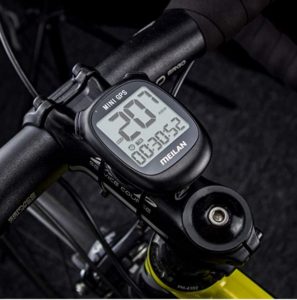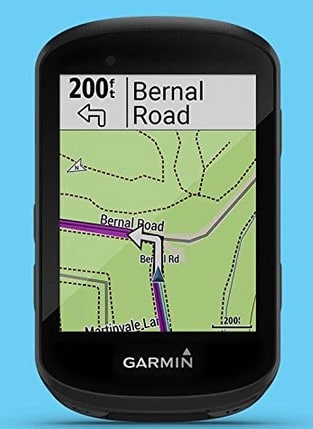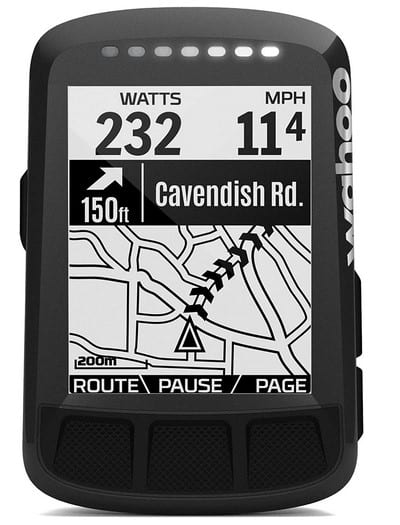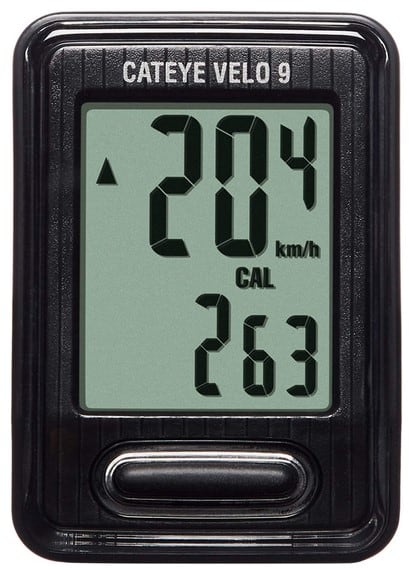With the emergence of smartwatches and the evolution of smartphones, it’s easy to assume that a bike computer is not necessary. So, it’s normal to ask, ‘do I need a bike computer if I have either of the two?
A bike computer enables you to track your cycling performance, plan for your routes, and easily navigate your bike. Plus, it allows wireless connections and frees up your smartphone.
So, you undoubtedly need a bike computer even if you have a smartwatch or smartphone. I’ll compare the three (bike computer, smartphone, and smartwatch) to help you get my argument.
Note, however, that the performance and capabilities of bike computers vary between brands. So, some promise you better value, and I’ll review them in this post.

In a hurry? Check out the most innovative bike computers on the hotlist below.
3 Best Bike Computers On the Market
1. Garmin Edge 530: Best Wireless Bike Computer
2. Wahoo ELEMNT Bike Computer: Best Waterproof Option
3. CAT EYE Velo 9: Best Budget Wireless Bike Computer
Do I Need A Bike Computer? (4 Reasons Why You Need One)
A good bike computer doesn’t come cheap. You may spend $250-$400 on a decent option.
So, you’ve to be sure of the purchase.
Generally, here are the reasons why a cycling computer is worth the money:
1. Easy Performance Tracking
A bicycle computer enables you to track your distance, speed, cadence, and calories to allow you to measure your performance.
Others even allow you to track your cycling recovery, altitude acclimation, training balance, and hydration.
They essentially employ GPS reporting to give you reliable real-time stats that define your cycling performance.
All these stats help you determine where you lie in performance.
2. Easy Route Planning and Navigation
Different cycling computers employ unique technologies to enable you to plan for your routes and navigate seamlessly.
An option like the Wahoo ELEMNT Bike Computer lets you create a route that you can follow. But still, you can download cycling apps like RideWithGPS and Strava and use them for navigation.
Other cycling computers, especially by Garmin, have popularity routing functions that let you popularize your cycling route like a local cyclist.
3. Bike Computers Promote Wireless Connection
Most bike computers allow Wi-Fi, Bluetooth, and ANT+ connectivity. As a result, it’s easy to pair them with your smartphone and other devices.
4. Bike Computers Free Up Your Smartphone
While a smartphone can do most of the things that a bike computer does, it quickly becomes overwhelmed with your texts and emails. So, you could easily get distracted.
Additionally, you could quickly drain and kill your phone’s battery if you routinely use it for cycling.
A cycling computer saves you from that. An option such as the Garmin Edge 530 has a 20-hour battery life that you can extend to 40 hours with its Charge Power Pack.

Do I Still Need A Bike Computer When I Have A Smartphone or Smartwatch?
As I mentioned earlier, it’s easy to assume that you don’t need to invest in a bike computer when you have either a smartphone or smartwatch.
The truth is that all three devices have their strength. But do they apply in cycling?
Let’s compare them below:
1. Battery Life
Since you use your phone to call, text, and browse, its battery is likely to drain much faster if you also use it to monitor your cycling performance.
The same goes for your smartwatch’s battery.
In contrast, a cycling computer offers you extended battery life, with some stretching to 20 hours or more. So, the minicomputer saves you from killing your phone’s or smartwatch’s battery.
2. Cycling Safety
The problem with smartphones and smartwatches is that they do a lot of things that easily overwhelm them. You take calls, read emails, and browse (in the case of smartphones), which can easily distract you.
That’s unlike cycling computers which only display relevant cycling stats.
3. Software and Hardware Integration
Smartphones and smartwatches generally allow you to access and use an array of apps. However, most of the applications are not cycling-centered.
Cycling computers, in contrast, allows you to access cycling-centered apps.
Plus, you can also integrate hardware solutions like pulse monitors, bike trainers, power sensors, and even your smartphone (as it’s a hardware device)
4. Data Accuracy
Smartphones and smartwatches mostly solely depend on GPS to track your cycling performance.
Cycling computers, in contrast, apply GPS and other satellites to provide you with real-time positional data that you can rely on.
Bike computers even allow you to share your real-time location with other cyclists.
5. Wireless Connectivity
Smartphones and smartwatches typically allow Bluetooth and Wi-Fi connectivity. But when it comes to cycling computers, they also permit ANT+ connectivity in addition to Bluetooth and Wi-Fi.
The ANT+ technology enables easy activity tracking.
6. Water-Resistance
While most smartwatches and some smartphones are water-resistant, it becomes hard to read vital cycling stats when it rains. It’s, however, seamless to do it with a cycling computer.

Best Bike Computers Reviewed!
They include:
1. Garmin Edge 530 – Best Bike Computer Wireless
The Garmin Edge 530 is everything you expect from the best cycling computer.
This wireless computer allows Bluetooth, Wi-Fi, and ANT+ connectivity and comes enabled with the world map for convenient use anywhere in the world.
It’s all touchscreen and bragging of a 2.6-inch TFT color display that you can read under all light conditions.
Plus, it comes with 20-hour battery life but is extendable to 40 hours with a Garmin Charge Power Pack.
This Garmin bike computer is customizable with free apps and widgets. Remarkably, it enjoys mapping technology, popularity routing (to localize your cycling), performance monitoring, and trail difficult rating.
What’s more, the mini biking computer is paired with your smartphone.
Best Features
- Phone-paired
- Popularity rating
- Performance monitoring
- 6-inch TFT display
- 20-hour battery run time
- Mapping technology
2. Wahoo ELEMNT Bolt GPS Bike Computer – Best Waterproof Cycling Computer
If you want to continue cycling in the rain, the Wahoo ELEMNT Bolt GPS Bike Computer is a fantastic choice.
Thanks to its 1PX7 waterproof rating, this bike computer resists water damage up to 5 feet.
Its battery life is impressive, given that it can run for 15 hours.
The cycling computer supports GPS and an array of satellites like Galileo, Globus, and QZSS.
Not only does it pair with its free app (ELEMNT Companion) but also with free third-party mobile apps like Strava, Single Tracks, and RideWithGPS.
This cycling computer comes with several mounts (out-front and stem option) for easy attaching on the bike. Additionally, it comes with a charging cable.
Best Features
- Waterproof
- 15-hour battery runtime
- Free app customization
- GPS and satellite support
- Mounting accompaniments
3. CAT EYE Velo 9 Wired Bike Computer – Best Budget Bike Computer
If you want a decent budget cycling computer, you cannot go wrong with CAT EYE Velo 9 Wired Bike Computer.
You’ll, however, have to settle for a wired sensor and not a wireless option, as it’s the case with the above two.
This bike computer does the basic jobs, including displaying vital stats like speed, distance, and time elapsed.
But unlike most budget cycling computers, CAT EYE Velo 9 has an intelligent sensor that detects when you take a break to stop counting.
It also can track your calories, making it a good choice for fitness cycling.
Remarkably, its battery lasts up to 3 years. Moreover, it has an easy-to-read screen and enjoys an easy setup.

Best Features
- Wired smart sensor
- calorie tracker
- 3-year battery life
- Easy-to-read screen display
- Easy setup
FAQs
1. Are Bike Computers Worth It?
Bike computers enable you to plan for your routes, know where you are, share your location, and easily navigate the trails.
They also allow you to monitor your speed, distance, and how hard you cycle. So, there’s no doubt that they are worth it.
2. What Is The Point Of A Bike Computer?
Ideally, the role of a bike computer is to display vital cycling stats like distance, elapsed time, speed, cadence, and altitude. Others even allow you to track your heart rate, which is amazing
3. Can I Use My Phone As A Cycle Computer?
Nowadays, there are many mobile apps, some free, that you can install on your phone and use as a cycle computer. The only issue is that the apps could drain your battery and overwhelm your phone.
4. Do I Really Need A Bike Computer If I Have An Apple Watch?
An Apple watch is undoubtedly a reliable cycling solution as you can use it to determine cycling speed, distance, and even pulse and calories burned.
So, if you want to monitor the basics, then you don’t need a cycle computer. But if you plan to integrate more software and hardware, a bike computer is necessary.
5. What Are The Best Free Cycling Apps?
Here are the best free bike mobile apps:
- Strava – Best for tracking your performance
- Rain Alarm – Best for weather prediction
- Cycle Meter – Best for route scheduling
- Cycle Street – Best for route planning
Closing Thought: Do I Need A Bike Computer?
If you intend to track your cycling performance, plan for your road trips, know where you are, and share your location, a bike computer is worth it.
I’ve reviewed three of the hottest cycling computers. So, pick what suits you most!